2012 Sea-Doo GTI SE 130 Review
Taking entry-level to a new level
Sea-Doo truly pushed the envelope on the recreational segment in 2011, unveiling a new GTI platform that packed a lot of features into boats with an entry-level price tag. The entire line returns for 2012, including the popular GTI SE 130.
More Features
Introductory models used to be stripped-down versions of what you could find at the other end of the price spectrum, but Sea-Doo ignored conventional wisdom with the GTI makeover. Included on the SE 130 are numerous flagship features that actually are well suited to a beginner audience.
 Squeeze the iBR lever and the reverse/brake bucket is activated.
Squeeze the iBR lever and the reverse/brake bucket is activated.And yes, those offerings include Sea-Doo’s vaunted Intelligent Brake and Reverse (iBR). Originally a big-ticket item, iBR makes its way to the entry-level in the GTI. The system works by utilizing a combination reverse/brake bucket, which is activated by a pull lever mounted on the left-hand grip. The “intelligent” portion of the equation means it’s computer-controlled. Squeeze the lever and thrust is interrupted for a microsecond as the bucket drops into place; thrust is then reapplied, redirected forward by the bucket, and used to rapidly slow the craft’s forward momentum. The system shortens the craft’s stopping distance by about 50%. The computer keeps the driver from applying enough force to get pitched over the bow, and the driver can feather the lever to smooth the stop much like you would do in a car. Collision-avoidance techniques are still best in some situations, but the brake clearly adds a level of control that is welcome.
I like the added stopping power, but I’ve always touted the other benefit of iBR — that it allows an equipped boat to start in a neutral mode, and then be shifted into forward or reverse while the driver keeps both hands on the handlebars and eyes on the water. No more lunging forward as the craft starts, or playing with a reverse lever on the console. It makes the craft ultra-maneuverable around tight areas like launch ramps or docks, and will avoid many a ding to the paint job.
 Switching to fuel-saving ECO mode is as easy as pressing a button on the handlebar.
Switching to fuel-saving ECO mode is as easy as pressing a button on the handlebar.
Electronic throttle also makes its way to a recreational model. It enables cruise control, which is nice for long rides or towing duties, a no-wake mode, and several acceleration modes including a tamer touring setting, a more aggressive sport setting, and a fuel-saving ECO setting. Those latter modes are now easier to switch into via handlebar buttons.
Looking Good
Features aside, it’s the GTI’s looks that will arguably grab your initial attention. Borrowing some of the faceted design from the GTX line, this craft looks nothing like the dated GTI of old. Instead, it sports an upscale appeal that is matched by an improved fit and finish. The makeover is welcome, and probably had its roots in the fact that recreational craft aren’t just being purchased by those watching their pennies, but instead a wide range of consumers.
 The 2012 GTI SE 130 offers a fairly low profile, which helps lower the craft’s center of gravity for a more stable ride.
The 2012 GTI SE 130 offers a fairly low profile, which helps lower the craft’s center of gravity for a more stable ride.The GTI is lower than its predecessor, giving the boat a sleeker appearance and reducing its center of gravity. On the SE models, driver and passenger sit on a broad, comfortable, touring-style saddle that narrows forward. That makes it easier to stand, as well as alleviates that feeling of being forced too wide that I find on many craft. Footwells cant inward to further relieve pressure on knees and ankles, as well as offer occupants a feeling of leverage in the turns, and flow fore and aft without distinct bends to keep a driver’s feet in constant contact. What’s missing? Handlebar tilt. With all this great attention to ergonomics, I found myself longing for the adjustability when standing. Designers did, however, think to move the information display forward so that it’s equally visible standing or seated. The SE package adds additional gauge functions like fuel consumption meter, clock, and trim position, as well as a fold-down reboarding step. Improved wide-angle mirrors also give a better view of what’s going on in the boat’s wake.
While the top deck is new, the hull below is quite familiar. Sporting a shallow 16-degree deadrise, it retains the playful, looser feeling the GTI line has long been known for. In fact, it’s virtually the identical hull of old, just lengthened slightly at the bow and beefed up at the stern to add buoyancy as well as a little more room to the boarding platform. Carve it right and you can slice up a buoy course with precision. Play with your body weight and you can spin and slide like the good old days. Spray-reducing chines knock down splash. The only quirk I noted was a little bit of a tendency for the bow to hunt when following in other boat’s wakes. It’s not a condition you’ll encounter often.
Performance? I noted a top speed just shy of 55 mph and a low-end acceleration peppy enough for towing duties from the 130’s Rotax 4-TEC. It’s an engine that’s been well tested and should deliver good reliability for years to come.
Stiff Competition
With this abundance of features (including requisite offerings like the Learning Key speed and theft-control lanyard system), Sea-Doo continues to up the ante in the recreational segment. That makes the GTI SE 130 appealing to those strapped for cash…as well as those flush with it. At the same time, some of those very features — braking, throttle control — make the boat a better choice than ever for the introductory, first-timer market.
In other words, don’t expect to see any sophomore slump.
| 2012 Sea-Doo GTI SE 130 Specs | |
| Length | 132.6 inches |
| Beam | 48.5 inches |
| Curb Weight | 755 lbs |
| Engine | Naturally aspirated three-cylinder EFI |
| Displacement | 1,494 cc |
| Bore and Stroke | 100 mm x 63.4 mm |
| Compression Ratio | 10.6:1 |
| Fuel Capacity | 15.9 gal. |
| Combined Stowage Capacity | 30.8 gal. |
| Colors | Black and Sunshine, Viper Red |
| Price | $9,799 |
Related Reading
2012 Sea-Doo PWC Lineup Preview
2012 Sea-Doo GTX S 155 Review
2012 Kawasaki STX-15F Review
2012 Yamaha VX Sport Review
Get PersonalWatercraft.com in your Inbox!
Like PersonalWatercraft.com on Facebook
Comments
Most Popular
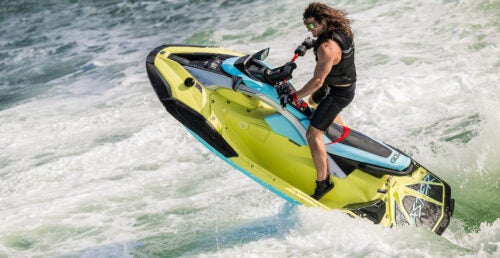
2025 Yamaha JetBlaster PRO 2-Up Review
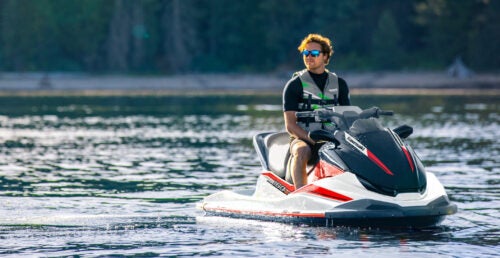
2024 Kawasaki Jet Ski STX 160X Review
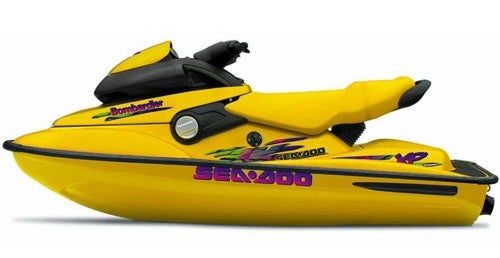
Remembering the Sea-Doo XP
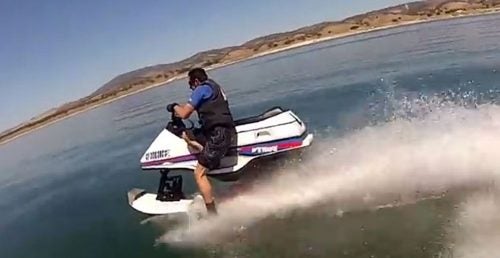
Whatever Happened to the Wetbike?
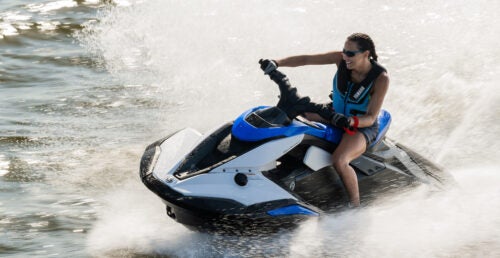
2025 Yamaha JetBlaster Review

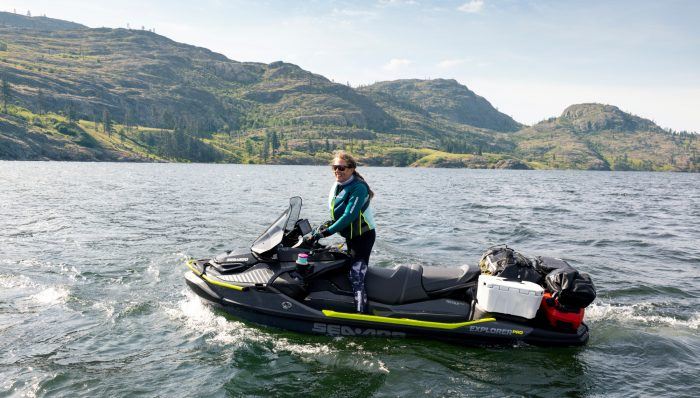
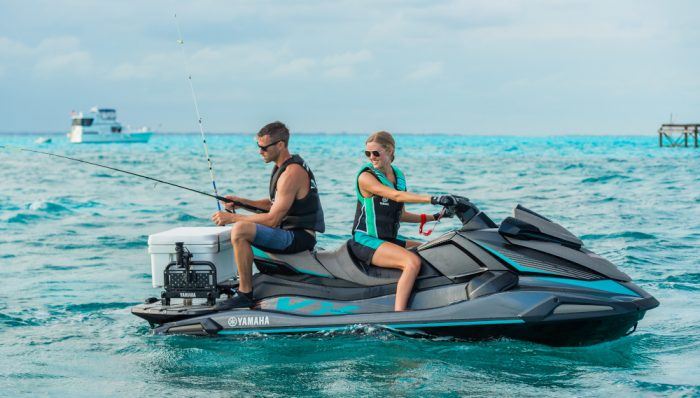

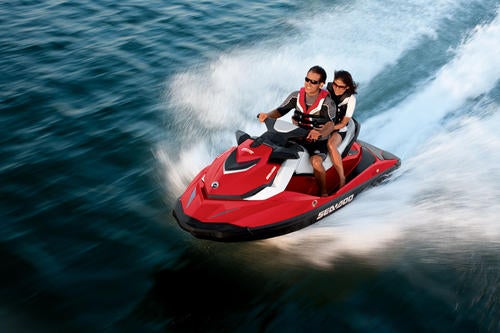
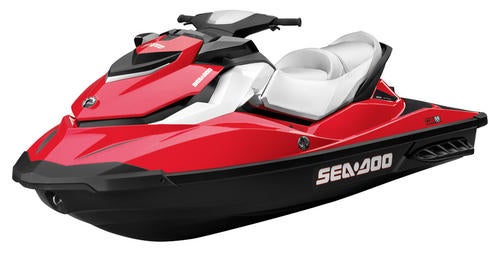
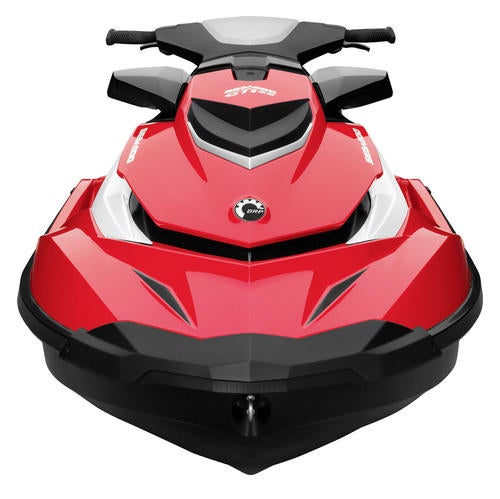
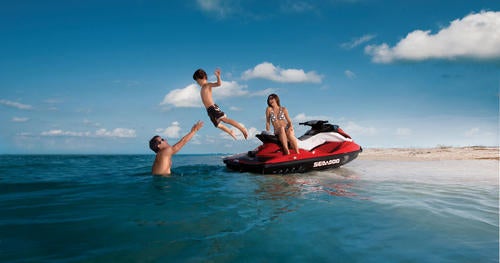



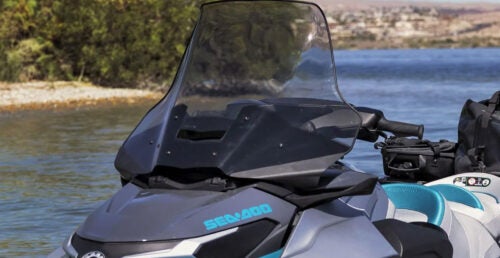



 Your Privacy Choices
Your Privacy Choices